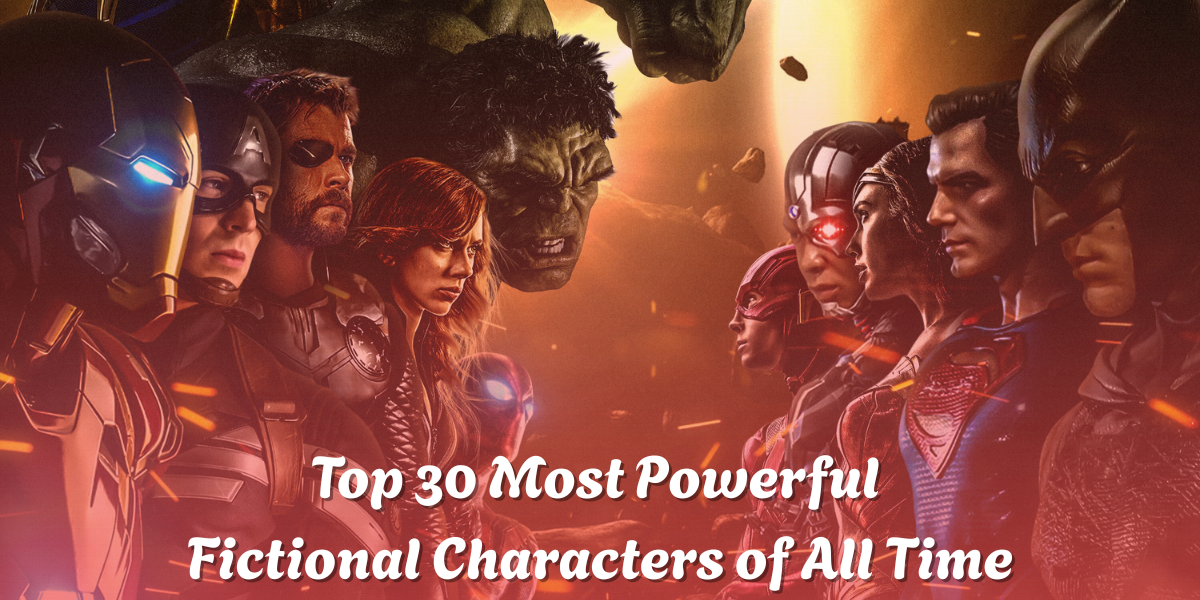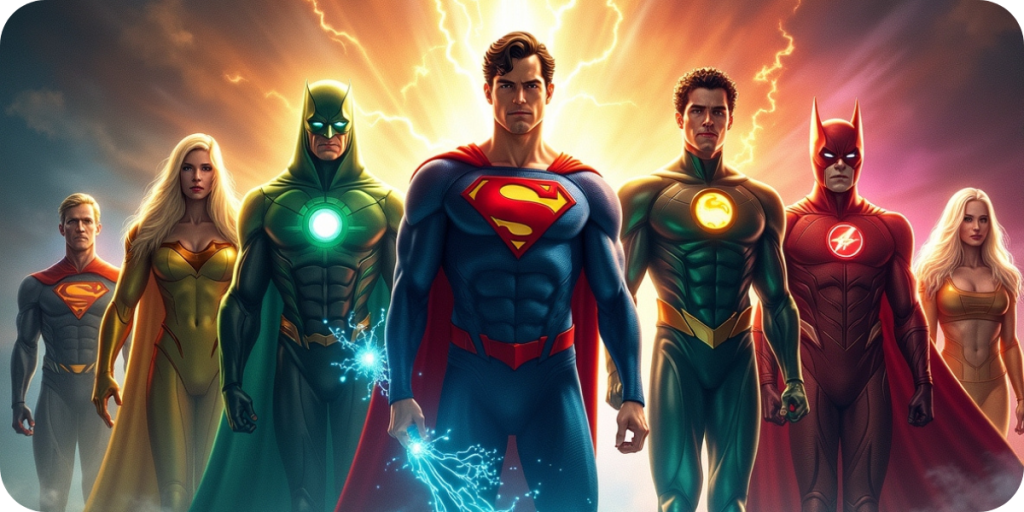Power in fiction isn’t just about who can punch hardest or blow up planets
it’s about lasting influence.
A most powerful character in fiction could be Superman lifting mountains, but it’s also Tyrion Lannister outsmarting armies with words. We judge power by three pillars: ability (Thanos’ snap), intelligence (Sherlock’s razor-sharp logic), and cultural staying power (how many kids still whisper “Expelliarmus!” decades later). The best characters don’t just win battles—they redefine what victory means.
Think of it this way: Any villain can destroy a city, but icons like Darth Vader or Wonder Woman haunt our collective imagination.
Their power transcends their stories—it sparks debates, inspires art, and even shapes real-world values. That’s why this list goes beyond stats. It’s about characters who didn’t just exist in their worlds—they changed ours.
When we debate the most powerful character in fiction, we’re considering:
- Raw Strength (Thanos’ snap)
- Brilliant Minds (Sherlock’s deductions)
- Cultural Impact (How many kids grew up wanting to be Harry Potter?)
From universe-creating gods to street-level heroes who inspire generations, these 30 icons redefine what power means. Some bend reality with a thought. Others conquer hearts with their stories.
Why This List Matters:
The best fictional characters aren’t just strong – they stick with us. They’re the ones we argue about at 2 AM, cosplay as at conventions, and secretly measure other characters against.
“Strength is what you can destroy. Power is what you can inspire.”
Here is the detailed list of fictional characters along with their strengths & weaknesses:
The God-Tier (Cosmic Powers)
The God-Tier (Cosmic Powers) features characters whose power transcends mortal limits—think universe-creators, multiverse manipulators, and beings who treat physics like casual suggestions. These are the greatest fictional heroes of all time, not for their heroism, but for their sheer scale: they rewrite reality, defy death, and exist as forces of nature. From Superman’s solar-powered invincibility to The One Above All’s omnipotence, they define what it means to be the most powerful character in fiction.
1. Superman (DC Comics)
The Hero Who Defined Power
When people debate the most powerful character in fiction, Superman is the benchmark. Created in 1938, the Last Son of Krypton isn’t just strong—he’s the archetype of super heroism. Solar-powered cells grant him invincibility, flight, and heat vision, but his true power lies in his symbolism. He’s the immigrant story writ large (sent from a dying world), the moral compass who chooses restraint, and the reason every subsequent hero answers the question: “But could they beat Superman?”
Strengths:
- Near-invincibility: Bullets bounce, buildings crumble, he doesn’t.
- Speed: Faster than light (can time-travel by accident).
- Morality: His greatest weapon inspires hope in-universe and in readers.
Weaknesses:
- Kryptonite: The narrative cheat code to challenge him.
- Magic: No special resistance (wizards wreck him).
- Over-reliance on solar energy: Red suns depower him.
Media Spotlight:
- Movies: Superman: The Movie(1978), Man of Steel (2013)
- TV: Smallville, Superman & Lois
- Comics: All-Star Superman(definitive power showcase)
2. The One Above All (Marvel)
The Omnipotent Footnote
Marvel’s “best fictional character” you’ve never seen fight. TOAA isn’t just powerful—it is power. Introduced as a meta-joke (literally modeled after Marvel’s then-editor-in-chief), this entity sits outside the multiverse, dictating reality like an author writing their own story.
No feats, no weaknesses—just absolute control. Its power isn’t in screen time, but in implications: every Marvel event, from Infinity Gauntlet to Secret Wars, happens because TOAA allows it.
Strengths:
- Omnipotence: Can rewrite Marvel’s rules on a whim.
- Narrative control: Even Deadpool’s fourth-wall breaks are part of its design.
- Mystique: Rarely appears, making every cameo an event.
Weaknesses:
- None: By definition. The closest thing to a “flaw” is disinterest.
Media Spotlight:
- Comics: Fantastic Four #511 (first full appearance), Ultimate Fantastic Four
- Mentions: Referenced in Doctor Strange and Loki (TV series)
3. God (Biblical/Supernatural Fiction)
The Original Omnipotent
No list of the greatest fictional heroes of all time is complete without the ultimate paradox: God as a character. From Genesis to Supernatural, depictions range from benevolent creator to absent landlord. In fiction (key distinction), God’s power lies in ambiguity—祂’s a plot device who operates through prophets, miracles, and the occasional plague. Modern takes like The Shack or Lucifer humanize divinity, but the core remains: when God acts, reality obeys.
Strengths:
- Omnipotence: By definition, can do anything.
- Moral authority: Shapes in-universe ethics (10 Commandments, etc.).
- Adaptability: Portrayed as vengeful, loving, or silent—whatever the story needs.
Weaknesses:
- Free will: Often “limits” Himself to respect human choice.
- Interpretation: Power varies wildly by depiction (comedy horror).
Media Spotlight:
- Literature: The Bible, Paradise Lost
- TV: Supernatural, The Good Place
- Film: The Passion of the Christ, Bruce Almighty
4. Dr. Manhattan (DC/Watchmen)
The Blue Philosopher-God
Born from a quantum accident, Dr. Jon Osterman became the most powerful character in fiction to grapple with existential boredom. His abilities—teleportation, matter manipulation, time perception—are dwarfed by his detachment from humanity. In Watchmen, he’s less a hero and more a cosmic observer, asking: “Why save a world I no longer care about?” His power isn’t just rewriting atoms; it’s making readers question free will in a predetermined universe.
Strengths:
- Reality Warping: Disassembles and reassembles himself (and others) at will.
- Timelessness: Perceives past, present, and future simultaneously.
- Invulnerability: Survived intrinsic field subtraction (aka being blown apart).
Weaknesses:
- Apathy: Power breeds indifference to human struggles.
- Predictability: Trapped by his own perception of a fixed timeline.
- Emotional Fragility: Vulnerable to psychological manipulation (thanks, Ozymandias).
Media Spotlight:
- Comic: Watchmen(1986)
- TV: Watchmen(2019 HBO series)
- Film: Watchmen(2009)
5. Galactus (Marvel Comics)
The Devourer of Worlds
Galactus isn’t evil—he’s hunger incarnate. As a “greatest fictional hero of all time” (if survival of the cosmos counts), this cosmic entity consumes planets to sustain his existence.
Born during the universe’s previous death, he’s less a villain and more a natural disaster in a snazzy purple helmet. His heralds (like Silver Surfer) scout buffets for his endless appetite, making him the ultimate “best fictional character” for exploring moral ambiguity.
Strengths:
- Planet-Level Power: Devours worlds with the Power Cosmic.
- Immortality: Older than the universe itself.
- Heralds: Recruits powerful beings (e.g., Silver Surfer) to do his bidding.
Weaknesses:
- Dependency: Needs planets to survive (not a choice, a biological imperative).
- Arrogance: Underestimates “lesser” beings (Fantastic Four outsmarted him).
- Moral Code: Rarely attacks inhabited worlds… unless desperate.
Media Spotlight:
- Comics: Fantastic Four #48(first appearance), Ultimates
- Film: Fantastic Four: Rise of the Silver Surfer(2007)
- Games: Marvel’s Ultimate Alliance
6. The Presence (DC Comics)
The Silent Architect
DC’s answer to God (literally), The Presence, is the most powerful character in fiction you’ve never heard of. Operating through avatars (The Spectre, The Voice), this entity crafts DC’s multiverse like a sandcastle effortlessly. It’s less a character and more the idea of divine authority, appearing as a glowing light or a humble janitor. Its power? Making Lucifer Morningstar himself admit, “You win.”
Strengths:
- Omnipotence: Created the DC multiverse (and can unmake it).
- Omniscience: Knows every possible outcome of every event.
- Mystery: Rarely intervenes, making its few appearances iconic.
Weaknesses:
- Ambiguity: Power level varies by writer (sometimes hands-off, sometimes meddling).
- Free Will Paradox: Allows evil to exist (for “balance”).
- Proxy Reliance: Works through angels/demons, not directly.
Media Spotlight:
- Comics: The Spectreseries, Lucifer (Vertigo)
- TV: Lucifer(Fox/Netflix, indirect references)
- Literature: The Sandman(Neil Gaiman’s interpretation)
7. Franklin Richards (Marvel Comics)
The Reality-Warping Prodigy
As the son of Mr. Fantastic and the Invisible Woman, Franklin Richards isn’t just a mutant—he’s Marvel’s most powerful character in fiction in training. With abilities that dwarf most cosmic entities, Franklin can warp reality, create universes, and manipulate time and space, often unconsciously.
His raw power once resurrected the entire Marvel multiverse, earning him a spot among the greatest fictional heroes of all time. Yet, his youth and emotional volatility make him a poignant figure, balancing godlike potential with childlike innocence.
Strengths:
- Reality Manipulation: Rewrites existence on a whim (once recreated Earth-616).
- Energy Projection: Generates universe-level energy blasts.
- Immortality: Aging halted by his own powers.
Weaknesses:
- Emotional Instability: Powers fluctuate with his mood.
- Exhaustion: Overuse drains him temporarily.
- Mentorship Dependency: Relies on guidance (e.g., Future Foundation).
Media Spotlight:
- Comics: Fantastic Four, FF (Future Foundation), Secret Wars(2015)
- Animated: Fantastic Four: World’s Greatest Heroes
8. Lucifer Morningstar (DC/Vertigo)
The Rebel King of Free Will
DC’s Lucifer Morningstar isn’t just Satan—he’s the “best fictional character” embodiment of defiance and autonomy. Cast out of Heaven for rejecting divine control, he wields power rivaling The Presence (DC’s God).
His abilities include reshaping realities, outwitting cosmic entities, and bending Hell itself to his will. Yet, his true strength lies in his unyielding free will, making him a “greatest fictional hero of all time” for anti-establishment narratives.
Strengths:
- Cosmic Manipulation: Alters realities and dimensions effortlessly.
- Invulnerability: Survived battles against archangels and Godlike beings.
- Intellect: Outsmarted gods, demons, and Death herself.
Weaknesses:
- Pride: Reluctant to ask for help, even when vulnerable.
- Divine Bindings: Can be constrained by ancient holy artifacts.
- Apathy: Often disinterested in mortal affairs unless challenged.
Media Spotlight:
- Comics: The Sandman, Lucifer(Vertigo series)
- TV: Lucifer(Fox/Netflix adaptation)
- Literature: Lucifer: The Divine Comedy
Category Summary
The God-Tier (Cosmic Powers) redefines power through universe-altering capabilities and existential influence. These characters don’t just dominate their worlds—they shape the very fabric of fiction, blending raw might with philosophical depth.
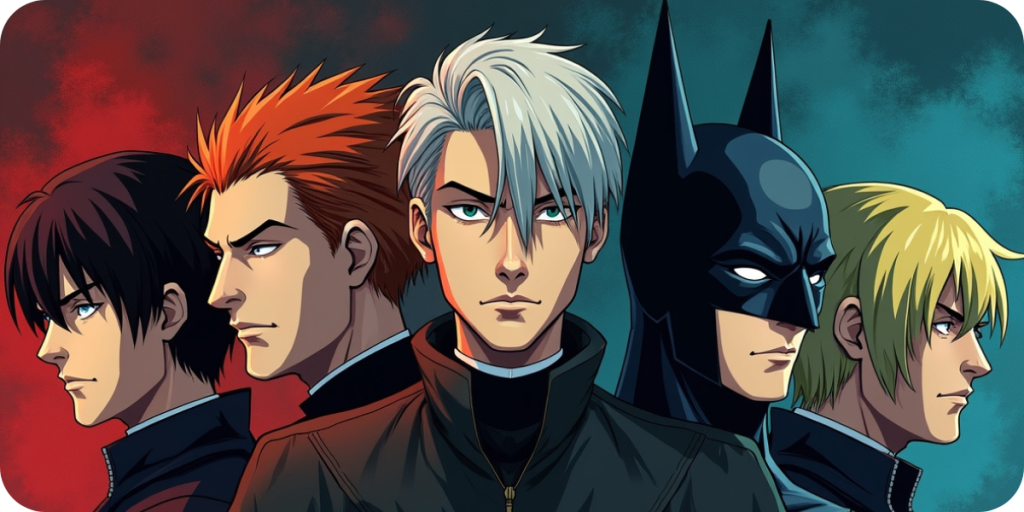
The Genius Minds (Strategic Power)
Forget brute strength—this category celebrates characters who conquer worlds with wit, not weapons. These masterminds outplay gods and armies using strategy, manipulation, and cold, calculated logic. They’re the chess players in a universe of checkers, proving that the best fictional characters don’t need superpowers to bend reality to their will.
1. Sherlock Holmes
The Original Brainiac
Sherlock Holmes isn’t just a detective—he’s the blueprint for every genius in fiction. With a mind that treats crime scenes like Sudoku puzzles, Holmes deduces secrets from cigar ash, handwriting, or the tilt of a hat.
Arthur Conan Doyle’s creation redefined intelligence as a superpower, inspiring famous fictional characters like Batman and Dr. House. His power? Turning observation into omniscience.
Strengths:
- Deductive Mastery: Solves crimes before the police finish breakfast.
- Memory Palace: Recalls every detail with photographic precision.
- Disguise Expertise: Blends into any environment (even as a beggar or priest).
Weaknesses:
- Boredom: Without mental challenges, he spirals into self-destructive habits.
- Social Blind Spots: Struggles with empathy (often alienates allies).
- Addiction: Uses drugs to cope with mundanity.
Media Spotlight:
- Books: A Study in Scarlet, The Hound of the Baskervilles
- TV: Sherlock(BBC), Elementary
- Films: Sherlock Holmes(RDJ), Enola Holmes
2. Light Yagami (Death Note)
The God Complex in a School Uniform
Light Yagami doesn’t just want to rule the world—he wants to cleanse it. Armed with the Death Note (a notebook that kills anyone whose name he writes), this honor student becomes Kira, a self-proclaimed god of justice. His strategic genius lies in outthinking detectives, manipulating allies, and staying steps ahead of global manhunts. But his fatal flaw? Believing he’s untouchable.
Strengths:
- Tactical Brilliance: Plays entire governments like pawns.
- Charisma: Convinces followers he’s a messiah.
- Resourcefulness: Uses mundane tools (e.g., potato chip bags) to evade capture.
Weaknesses:
- Hubris: Overconfidence leads to sloppy mistakes.
- Moral Decay: Starts with noble goals, ends as a tyrant.
- Dependency: Power hinges on the Death Note (loses without it).
Media Spotlight:
- Anime/Manga: Death Note
- Films: Death Note(Japanese live-action), Death Note (Netflix adaptation)
- Drama: Death Note: The Musical(yes, really)
3. Tywin Lannister (A Song of Ice and Fire)
The Lion Who Ruled Through Fear
Tywin Lannister doesn’t swing swords—he swings economies, marriages, and reputations. As patriarch of House Lannister, he rebuilt a bankrupt dynasty into a political juggernaut using ruthlessness and psychological warfare. His list of fictional characters’ legacy? The Red Wedding, a massacre so strategically brutal it redefined fantasy storytelling.
Strengths:
- Political Savagery: Turns enemies into allies (or corpses).
- Financial Acumen: Revived House Lannister’s wealth through trade and terror.
- Reputation Management: Makes entire kingdoms fear his wrath.
Weaknesses:
- Family Dysfunction: Failed to control Cersei, Jaime, and Tyrion.
- Legacy Obsession: Blind to his children’s flaws, dooming his house.
- Pride: Refuses to adapt to changing power dynamics.
Media Spotlight:
- Books: A Game of Thrones, A Storm of Swords
- TV: Game of Thrones(Charles Dance’s iconic portrayal)
- Quotes: “Any man who must say ‘I am the king’ is no true king.”
4. Lex Luthor (DC Comics)
The Titan of Tactical Villainy
Lex Luthor doesn’t hate Superman because he’s alien—he hates him because he’s human. The ultimate self-made genius, Luthor uses his IQ (rumored to be 225) to outthink gods, manipulate governments, and turn public opinion against the Man of Steel. His power? Proving you don’t need superpowers to be the most powerful character in fiction—just ambition, resources, and a very personal grudge.
Strengths:
- Strategic Mastermind: Plans decades ahead (even clones himself as backup).
- Wealth & Tech: Funds wars, builds mech suits, and terraforms planets.
- Charisma: Convinces the world he’s a philanthropist, not a sociopath.
Weaknesses:
- Superman Obsession: Derails his grand plans for petty revenge.
- Trust Issues: Betrays even loyal allies (losing potential partnerships).
- Mortality: No powers beyond his intellect (bullets still hurt).
Media Spotlight:
- Comics: All-Star Superman, Lex Luthor: Man of Steel
- Movies: Batman v Superman, Superman Returns
- TV: Smallville, Supergirl
5. Professor X (Marvel Comics)
The Telepathic Peacemaker
Charles Xavier’s power isn’t just reading minds—it’s uniting them. Founder of the X-Men, he uses his omega-level telepathy to broker peace between mutants and humans. While others fight, he plays 4D chess: manipulating events subtly, recruiting disciples, and outmaneuvering enemies like Magneto. His genius lies in seeing the best in people, even when they don’t see it themselves.
Strengths:
- Telepathy: Shuts down armies with a thought.
- Diplomatic Genius: Turns foes into allies (e.g., Magneto, Emma Frost).
- Long-Term Vision: Built the X-Men as a global safeguard.
Weaknesses:
- Physical Frailty: Paralyzed, reliant on tech (hoverchair/Cerebro).
- Moral Rigidity: Sometimes prioritizes ideals over pragmatism.
- Dark Side: Shadowy past (e.g., erasing memories, manipulating allies).
Media Spotlight:
- Movies: X-Menseries (Patrick Stewart/James McAvoy)
- Animated: X-Men: The Animated Series
- Comics: House of X/Powers of X
6. Batman (DC Comics)
The Dark Knight Strategist
Bruce Wayne’s superpower? Preparation. With no magic or mutations, Batman relies on intellect, gadgets, and psychological warfare to outplay gods and aliens. His contingency plans (even against allies like Superman) make him the “best fictional character” for proving brains beat brawn. From deducing identities to exploiting weaknesses, he’s the ultimate chessmaster in a cape.
Strengths:
- Detective Skills: Solves cosmic mysteries with forensic science.
- Resourcefulness: Turns everyday items into weapons (see: Bat-Shark Repellent).
- Fear Factor: Weaponizes his mythos to paralyze enemies.
Weaknesses:
- Mortality: One bullet could end him (and Gotham’s hope).
- Trust No One: Alienates allies with secrecy (Justice League tensions).
- Trauma: Obsession rooted in childhood pain (limits emotional growth).
Media Spotlight:
- Movies: The Dark Knight Trilogy, Batman v Superman
- TV: Batman: The Animated Series, Gotham
- Games: Arkham Asylum, Gotham Knights
7. Ozymandias (Watchmen)
The Utilitarian Visionary
Adrian Veidt, aka Ozymandias, doesn’t just outthink his enemies—he outthinks morality. A self-made billionaire and “world’s smartest man,” he engineers a fake alien invasion to unite humanity, sacrificing millions to save billions. His power lies in cold logic: “Do you really think I’d explain my masterstroke if there remained the slightest chance of you affecting its outcome?”
Strengths:
- Hyper-Intellect: Processes information faster than supercomputers.
- Physical Prowess: Peak human strength and reflexes (no capes needed).
- Resource Mastery: Funds global schemes through his empire.
Weaknesses:
- Emotional Detachment: Sees people as pawns, not humans.
- Guilt: Secretly doubts his “noble” genocide.
- Legacy Anxiety: Obsessed with being remembered as a savior.
Media Spotlight:
- Comic: Watchmen(Alan Moore’s masterpiece)
- Film: Watchmen(2009, Matthew Goode)
- TV: Watchmen(2019, HBO’s legacy sequel)
8. Lelouch vi Britannia (Code Geass)
The Rebel King of Tactics
Lelouch doesn’t need armies—he needs a chessboard and his Geass (mind-control power). A disgraced prince turned revolutionary, he topples empires by manipulating friends, foes, and entire nations. His motto? “The only ones who should kill are those prepared to be killed.” Among the famous fictional characters who weaponize charisma and sacrifice.
Strengths:
- Geass: Forces absolute obedience with eye contact.
- Strategic Brilliance: Wins wars without firing a shot (just words).
- Charismatic Leadership: Inspires cult-like loyalty.
Weaknesses:
- Overconfidence: Underestimates emotional bonds (e.g., Suzaku).
- Self-Sacrifice: Plans often hinge on his own death.
- Moral Ambiguity: Allies question his “ends justify means” ethos.
Media Spotlight:
- Anime: Code Geass: Lelouch of the Rebellion
- Films: Code Geassrecap trilogy (2017–2018)
- Games: Code Geass: Lost Stories
Category Summary
The Genius Minds prove that intellect is the ultimate superpower. These characters—strategists, manipulators, and visionary leaders—dominate not through fists, but through sheer brainpower. Whether uniting humanity via alien hoaxes (Ozymandias) or toppling empires with mind games (Lelouch), they redefine power as a mental battlefield. Their legacy? Cementing themselves as famous fictional characters who remind us that the pen (or Death Note) is mightier than the sword.
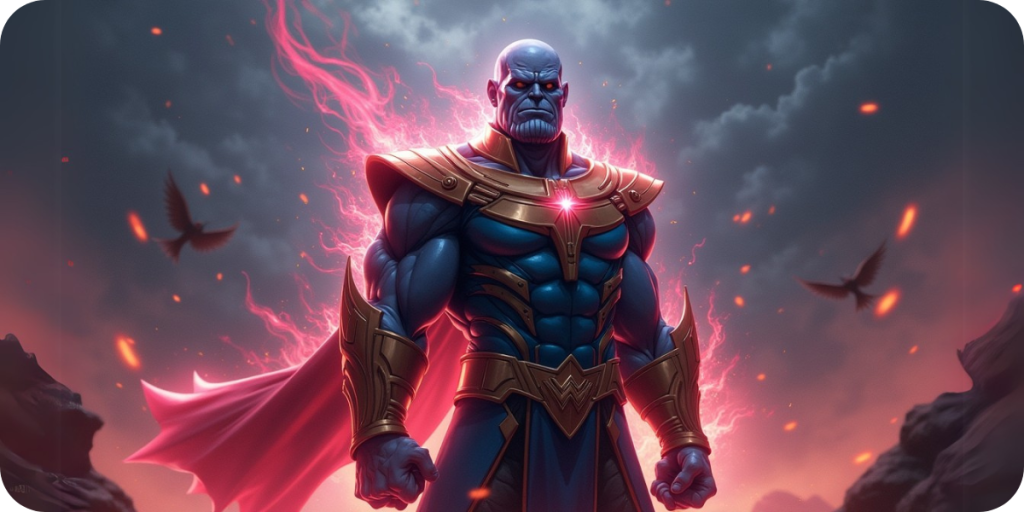
Unstoppable Forces (Raw Strength/Magic)
These characters don’t need strategy—they are the apocalypse. Whether crushing mountains, wielding universe-altering magic, or laughing at death, they redefine power through sheer force. Forget chessboards; their battles reshape continents.
1. Saitama (One Punch Man)
The Parody of Power
Saitama, the most powerful character in fiction, defeats gods with a single punch… and crippling boredom. His gag? Being too strong. What makes him one of the memorable fictional characters isn’t his strength (which has no limits) but his existential dread, winning so easily that life loses meaning. He’s a critique of power fantasies, wrapped in a discount superhero costume.
Strengths:
- One-Punch KO: Ends any fight instantly (even in space).
- Invincibility: No attack scratches him (black holes tickle).
- Speed: Moves faster than light casually.
Weaknesses:
- Boredom: Craves a challenge (never comes).
- Public Ignorance: Mistaken for a fraud (his hero rank: C-Class).
- Collateral Damage: Accidentally destroys cities while swatting flies.
Media Spotlight:
- Anime/Manga: One Punch Man
- Games: One Punch Man: A Hero Nobody Knows
- Memes: “OK.”(his battle cry)
2. Gandalf (The Lord of the Rings)
The Wizard Who Played 4D Chess
Gandalf’s power isn’t fireballs or lightning—it’s restraint. As a Maiar (angelic being), he could vaporize armies but chooses guidance over domination. His “popular fictional character” status stems from blending wisdom with warmth, like a grandfather who also fights Balrogs. “YOU SHALL NOT PASS!” isn’t a spell—it’s a divine command.
Strengths:
- Divine Magic: Channels light to banish ancient evils.
- Immortality: Dies, gets upgraded (Gandalf the White), and keeps fighting.
- Leadership: Unites races even Sauron can’t corrupt.
Weaknesses:
- Self-Limiting: Follows rules set by higher powers (Eru Ilúvatar).
- Mortal Form: Can be killed (see: Balrog rematch).
- Secrecy: Hoards knowledge until the last second (thanks for the vague hints).
Media Spotlight:
- Books: The Lord of the Rings, The Silmarillion
- Films: LOTR Trilogy(Ian McKellen’s iconic role)
- Memes: “Fly, you fools!”
3. Thanos (Marvel Comics/MCU)
The Mad Titan’s Cosmic Balance
Thanos isn’t just strong—he’s efficient. Wielding the Infinity Gauntlet, he erases half of all life with a snap. But his legacy among memorable fictional characters lies in twisted idealism: genocide as mercy. The MCU softened him (thanks, Josh Brolin), but comics reveal a tyrant obsessed with courting Death herself.
Strengths:
- Infinity Stones: Controls time, space, reality, and more.
- Tactical Genius: Outsmarts Earth’s heroes and cosmic gods.
- Endurance: Survives decapitation (comics) and cosmic storms (MCU).
Weaknesses:
- Self-Sabotage: Subconsciously wants to lose (lets Avengers undo his work).
- Emotional Baggage: Obsession with Death/Gamora clouds judgment.
- Gauntlet Dependency: Without stones, he’s just a really buff alien.
Media Spotlight:
- Movies: Avengers: Infinity War, Endgame
- Comics: The Infinity Gauntlet, Thanos Wins
- Cultural Impact: “Perfectly balanced, as all things should be.”
4. Goku (Dragon Ball)
The Saiyan Who Breaks Limits
Goku’s power isn’t just strength—it’s escalation. From smashing moons as a kid to battling multiverse-destroying gods, he thrives on pushing past “impossible.” His “popular fictional character” appeal? Pure-hearted combat addiction. He’ll spare enemies, train them, then beg for rematches—because winning’s boring unless everyone’s at their best.
Strengths:
- Limitless Potential: New transformations (Super Saiyan, Ultra Instinct) for every crisis.
- Combat Genius: Masters techniques mid-fight (copies Kamehameha after seeing it once).
- Zenkai Boosts: Near-death experiences make him stronger.
Weaknesses:
- Overconfidence: Let’s foes power up (because “fair fights”).
- IQ Outside Combat: Falls for obvious tricks (“Goku, that’s a bomb!”).
- Appetite: Distracted by food (even godly battles wait for dinner).
Media Spotlight:
- Anime: Dragon Ball Z, Dragon Ball Super
- Games: Dragon Ball FighterZ, Xenoverse
- Movies: Dragon Ball Super: Broly
5. Wonder Woman (DC Comics)
The Divine Warrior
Diana Prince isn’t just strong—she’s mythology in motion. Blessed by Greek gods, she wields the Lasso of Truth, deflects bullets with bracelets, and outmuscles Superman in arm-wrestling matches. Her status among memorable fictional characters stems from balancing compassion with Amazonian ferocity. She’s not here to conquer—she’s here to protect.
Strengths:
- Demigod Physiology: Lifts 100+ tons, flies, and heals rapidly.
- Combat Mastery: Trained for millennia in every weapon.
- Diplomatic Power: Unites gods, mortals, and even Cheetah (temporarily).
Weaknesses:
- Lasso Dependency: Truth compels hertoo (can’t lie while holding it).
- Compassion: Hesitates to kill, even when necessary.
- Man’s World Naivety: Struggles with human corruption (e.g., politics).
Media Spotlight:
- Movies: Wonder Woman(2017), Zack Snyder’s Justice League
- Comics: The Hiketeia, Wonder Woman: Dead Earth
- TV: Wonder Woman(Lynda Carter’s iconic 1970s series)
6. Magneto (Marvel Comics)
The Master of Magnetism
Erik Lehnsherr doesn’t just control metal—he controls war. A Holocaust survivor turned mutant revolutionary, Magneto bends stadiums into fortresses and turns bullets into dust. His “popular fictional character” legacy lies in moral complexity: Is he a villain, a freedom fighter, or both?
Strengths:
- Magnetic Godhood: Rips apart planets, manipulates Earth’s core.
- Force Fields: Blocks nukes, psychic attacks, and Thor’s hammer.
- Tactical Ruthlessness: Uses trauma as fuel (e.g., Asteroid M base).
Weaknesses:
- Ideological Tunnel Vision: Sees humans as irredeemable (alienates allies).
- Metal Dependency: Useless in plastic prisons (until he innovates).
- Aging: Power wanes with age (unless he steals youth).
Media Spotlight:
- Movies: X-Menseries (Ian McKellen/Michael Fassbender)
- Comics: X-Men: God Loves, Man Kills, House of M
- Games: Marvel vs. Capcom, X-Men: Legends
7. Meliodas (The Seven Deadly Sins)
The Demon King’s Rage Incarnate
Meliodas, captain of the Seven Deadly Sins, secures his spot among memorable fictional characters by blending adorable bartender charm with apocalyptic power. As the former leader of the Ten Commandments, he wields Full Counter (reflecting magic attacks) and Hellblaze (black flames that burn eternally). His strength isn’t just raw—it’s primal, forged through millennia of curses, tragic love, and a wrath that cracks continents.
Strengths:
- Full Counter: Reflects magic with a flick of his sword (even god-tier spells).
- Demon Form: Transforms into a near-unstoppable force (scales with anger).
- Immortality: Survives decapitation, dismemberment, and divine punishment.
Weaknesses:
- Emotional Triggers: Loses control when Elizabeth (his cursed lover) is threatened.
- Curse of Immortality: Can’t die, forcing him to watch loved ones perish.
- Moral Code: Refuses to kill humans, even when outmatched.
Media Spotlight:
- Anime: The Seven Deadly Sins(Netflix)
- Manga: Nanatsu no Taizai
- Games: The Seven Deadly Sins: Grand Cross
8. Rand al’Thor (The Wheel of Time)
The Dragon Reborn, Reality’s Unraveler
Rand al’Thor isn’t just powerful—he’s the most powerful character in fiction in a battle against fate. As the reincarnation of a doomed savior, he channels the One Power to reshape reality, but every feat risks madness from the male half of the Source (saidin). His journey from farm boy to apocalyptic messiah cements him among memorable fictional characters, balancing godlike power with human fragility.
Strengths:
- One Power Mastery: Melts armies, heals death, and bends time itself.
- Ta’veren Influence: Warps probability (allies stumble into luck, foes into disaster).
- Leadership: Unites fractured kingdoms against the Dark One.
Weaknesses:
- Madness: Hallucinations and paranoia from saidin’s
- Physical Toll: Channeling leaves him exhausted and bleeding.
- Self-Doubt: Struggles with the weight of prophecy (“I am the Dragon Reborn… but at what cost?”).
Media Spotlight:
- Books: The Wheel of Timeseries (Robert Jordan/Brandon Sanderson)
- TV: The Wheel of Time(Amazon Prime)
- Games: The Wheel of Time(1999 RPG)
Category Summary
The Unstoppable Forces redefine power through sheer, world-breaking might. These popular fictional characters dominate not with strategy, but by being the storm, whether it’s Meliodas’s demonic wrath or Rand’s reality-warping despair. Their strength is their legend, but their humanity (or lack thereof) is their anchor.
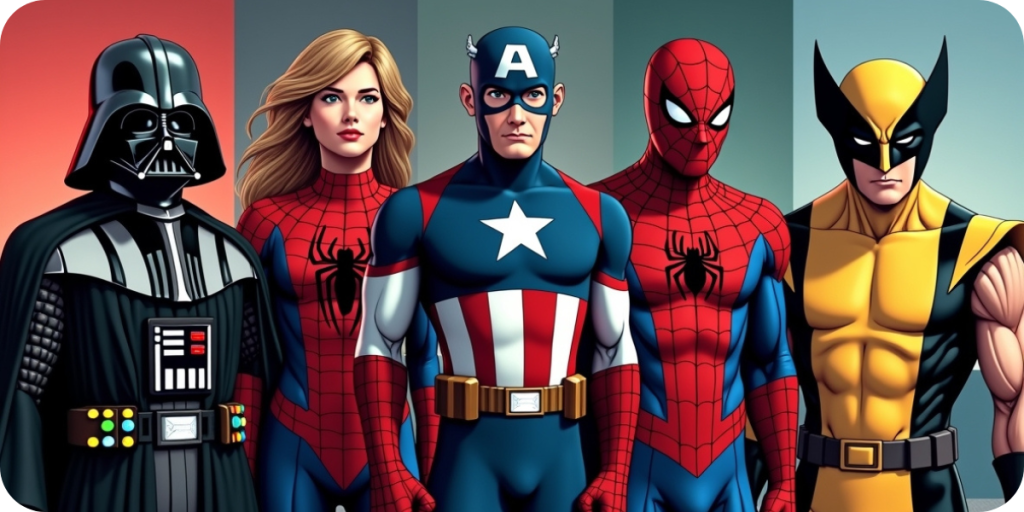
Fan Favorites (Cultural Dominance)
These characters transcend their stories to become cultural landmarks. Their power isn’t just in feats—it’s in shaping global fandoms, defining genres, and inspiring merchandise, memes, and Halloween costumes. They’re the faces of franchises, the ones even your grandma recognizes.
1. Darth Vader (Star Wars)
The Icon of Villainy
No character embodies the best fictional characters in movies like Darth Vader. From his labored breathing to his moral fall and redemption, he’s the ultimate tragic villain. Introduced as a galaxy-terrorizing enforcer, his legacy grew with prequels revealing Anakin Skywalker’s downfall. His cultural dominance? Merch sales, quotes (“I am your father”), and Halloween costumes that never go out of style.
Strengths:
- Force Mastery: Chokes rebels and crushes ships with a gesture.
- Intimidation Factor: Just his silhouette sparks fear.
- Legacy: Defines the “fallen hero” trope.
Weaknesses:
- Suit Dependency: Life support system = critical vulnerability.
- Emotional Baggage: Luke and Leia trigger existential crises.
- Overconfidence: Underestimates rebels (and his own kids).
Media Spotlight:
- Movies: The Empire Strikes Back, Rogue One
- TV: Obi-Wan Kenobi(Disney+)
- Games: Star Wars Jedi: Fallen Order
2. Harry Potter (Harry Potter Series)
The Boy Who Lived… Everywhere
The “best fictional character” for millennials, Harry turned a book series into a global phenomenon. His relatability—a lonely orphan finding belonging—made him a generational icon. From lightning scars to “Yer a wizard,” he’s shorthand for magic itself.
Strengths:
- Bravery: Faces Voldemort despite PTSD.
- Loyalty: Friendships (Ron/Hermione) save him repeatedly.
- Expelliarmus: Disarming spell turned fandom meme.
Weaknesses:
- Impulsiveness: Charges into danger without plans.
- Trust Issues: Withholds info (Dumbledore’s fault too).
- Hero Complex: Self-sacrifice to a fault.
Media Spotlight:
- Books: Harry Potter and the Sorcerer’s Stone
- Movies: Harry Potterfilm series
- Real World: Universal’s Wizarding World theme parks
3. Hermione Granger (Harry Potter Series)
The Brain Who Stole the Show
Hermione isn’t just smart—she’s one of the memorable fictional characters who redefined heroines. Bookish, bossy, and unapologetically brilliant, she outshines Harry in critical thinking (saves the trio constantly). Her cultural power? Inspiring a generation of girls to embrace brains over beauty.
Strengths:
- Magical Prowess: Masters spells years ahead of peers.
- Moral Courage: Fights for house-elves and muggle-borns.
- Leadership: Organizes Dumbledore’s Army.
Weaknesses:
- Perfectionism: Anxiety over grades and plans.
- Rule-Following: Early reluctance to break norms.
- Sass Overload: Alienates allies with bluntness.
Media Spotlight:
- Key Moments: Punching Malfoy, SPEW campaign, “It’s Leviosa, not Leviosar!”
- Fandom: #HermioneDeservedBetter trends
- Activism: Emma Watson’s UN speeches tie to Hermione’s legacy
4. Spider-Man (Marvel Comics)
The Everyman Superhero
Spider-Man’s power isn’t just webs and wall-crawling—it’s relatability. As the “popular fictional character” juggling rent, homework, and saving NYC, he’s the superhero for anyone who’s ever felt overwhelmed. His quippy one-lers (“Friendly Neighborhood Spider-Man”) and tragic origin (“With great power…”) turned him into a global symbol of responsibility wrapped in spandex.
Strengths:
- Spider-Sense: Dodges bullets before they’re fired.
- Agility: Flips through cityscapes like a gymnast on espresso.
- Genius Intellect: Builds web-shooters in his bedroom.
Weaknesses:
- Guilt Complex: Blames himself for Uncle Ben’s death (and everything else).
- Dual Identity: Balancing Peter Parker’s life andheroics burns him out.
- Villain Magnet: Every scientist he meets turns evil (looking at you, Otto).
Media Spotlight:
- Movies: Spider-Man: No Way Home(box office record-breaker), Into the Spider-Verse
- Comics: The Night Gwen Stacy Died(cultural reset)
- Memes: “Bully Maguire”dance trend
5. Captain America (Marvel Comics)
The Moral Compass in a Star-Spangled Suit
Steve Rogers isn’t just strong—he’s the “greatest fictional hero” for proving ethics can be a superpower. From scrawny kid to super-soldier, his shield symbolizes hope, not just defense. His legacy? Making “I can do this all day” a battle cry for underdogs and a meme for stubborn optimism.
Strengths:
- Vibranium Shield: Ricochets like a boomerang from hell.
- Leadership: Turns ragtag teams (Avengers) into a family.
- Endurance: Survived 70 years on ice (talk about a nap).
Weaknesses:
- Outdated Ideals: Struggles with modern cynicism (“This isn’t freedom. This is fear.”).
- Self-Sacrifice: Jumps on grenades (literal and metaphorical).
- No Super-Speed: Just a guy with a shield against gods.
Media Spotlight:
- Movies: Captain America: The Winter Soldier(spy thriller masterpiece), Endgame
- Memes: “Language!” from Age of Ultron
- Cultural Impact: Symbol of patriotism (and its critiques)
6. Wolverine (X-Men)
The Gruff Mutant With a Heart of… Adamantium
Wolverine isn’t just claws and healing—he’s among the famous fictional characters who made antiheroes cool. A century-old mutant drowning in PTSD and cigar smoke, Logan’s appeal is raw humanity: he’s a killer who hates killing, a loner who protects kids (*X-23*), and a hero who’d rather be left alone.
Strengths:
- Healing Factor: Survives nukes, decapitations, and Hugh Jackman’s workout routines.
- Adamantium Claws: Cuts through tanks, robots, and bad dialogue.
- Animal Instincts: Tracks enemies by scent (like a murderous bloodhound).
Weaknesses:
- Berserker Rages: Loses control (and allies) in battle frenzy.
- Memory Loss: Centuries of trauma buried under amnesia.
- Mortality: Healing factor slows with age (Loganbroke everyone).
Media Spotlight:
- Movies: Logan (Oscar-worthy sendoff), X-Men: Days of Future Past
- Comics: Old Man Logan(apocalyptic fan-favorite)
- Pop Culture: “Bub”as a greeting for edgy teens
Category Summary
These Fan Favorites dominate beyond their stories—they’re brands. Spider-Man sells toys, Cap’s shield symbolizes ideals, and Wolverine’s claws slash through merch racks. They’re proof that the best fictional characters in movies aren’t just powerful—they’re profitable.
Honorable Mentions
These characters left a lasting mark on pop culture but fell just short of cracking our top 30 list of fictional characters, whether due to niche appeal, power ceilings, or being overshadowed by bigger names. Here’s why they almost made it:
John Constantine
The Hellblazer’s street-smart cunning and knack for tricking demons make him a fan favorite, but his power lies in deception, not raw dominance. While he’s mastered the art of surviving hellscapes, his stories thrive in morally gray corners of DC’s Vertigo universe—too niche to compete with multiverse-level heavyweights.
Aang (Avatar: The Last Airbender)
The last Airbender’s mastery of all four elements and spiritual wisdom cemented him as a generational icon. But his pacifist ethos and reliance on balance, while revolutionary, left him overshadowed by characters who wield power without restraint. Airbending saves the world, but it doesn’t break it.
Geralt of Rivia (The Witcher)
A monster-slaying legend with unmatched swordsmanship and mutant grit, Geralt dominates dark fantasy. Yet his power is tethered to a grounded, grimy world—no match for cosmic threats or reality-benders. Even his moral complexity can’t bridge the gap between “monster hunter” and “multiverse conqueror.”
Katniss Everdeen (The Hunger Games)
The Girl on Fire redefined YA heroism with her revolutionary spirit and survival instincts. But her power is symbolic: she’s a rallying cry, not a superhuman force. In a list dominated by god-tier strength and magic, even the Mockingjay’s arrows can’t pierce planetary scales.
Neo (The Matrix)
The original “Chosen One” bent reality with code-manipulating prowess… until the sequels muddied his mythos. While his bullet-dodging and helicopter-crashing feats are iconic, later films diluted his legacy, leaving him stranded between messiah and middle manager.
Eleven (Stranger Things)
Stranger Things’ psychic prodigy shattered expectations (and dimensions) with her mind. But her cultural footprint is still fresh—she lacks the decades-long reign of icons like Wolverine or Wonder Woman. Give her time, and she might ascend from Hawkins to the pantheon.
Legolas (The Lord of the Rings)
Elven precision and ageless cool made Legolas a fantasy blueprint, but his power peaks at “elven swag.” In a realm of divine wizards and world-ending threats, even flawless archery can’t compete with universe-altering might.
Toph Beifong (Avatar: The Last Airbender)
The Blind Bandit’s earthbending genius redefined combat creativity, but her impact is tied to Team Avatar’s ensemble brilliance. While she’s a bending pioneer, solo feats like metalbending don’t stack up against S-tier reality warpers.
Vegeta (Dragon Ball)
The Prince of Saiyans evolved from villain to antihero, mastering godly transformations and pride-fueled grit. But in a franchise where Goku’s limitless potential defines power ceilings, Vegeta remains the eternal second—a tragic foil, not the apex.
Deadpool
The Merc with a Mouth breaks fourth walls, timelines, and expectations… but not power scales. His regenerative healing and chaos are legendary, yet his stories prioritize meta-humor over universe-shaking stakes. Sometimes, laughter isn’t the best weapon.
Why They Missed Our List of Fictional Characters
These characters excel in specificity, whether through niche fandoms, moral nuance, or genre constraints. But our top 30 list of fictional characters demanded either universal cultural dominance (Darth Vader’s breath haunts nightmares worldwide) or unmatched power feats (Superman bench-pressing planets).
Some honorable mentions are too human, too new, or too entangled in ensembles to claim solo glory. Others, like Deadpool and Constantine, trade brute force for wit and chaos—reminders that sometimes the how matters more than the how much in fiction.
Final Words
Power in fiction isn’t measured solely by universe-shattering punches or infinite IQ—it’s etched into cultural DNA. From Superman’s enduring hope to Darth Vader’s haunting legacy, the greatest fictional heroes of all time transcend their stories. They linger in debates, inspire generations, and remind us that true power is immortality in the imagination.
Take the Next Step with Arkham House Publishers
At Arkham House Publishers, we craft stories that defy time, not just tropes. Whether you’re shaping cosmic deities or morally gray strategists, let us elevate your narrative from draft to legacy.
Claim Your Consultation Today:
- Expert Guidance: Align your manuscript with 2025’s literary trends.
- End-to-End Support: From prose polishing to Amazon SEO dominance.
- Proven Results: Join ranks with authors who’ve turned words into worlds.
Explore Our Services
Where storytelling bends reality—and your legacy begins.

